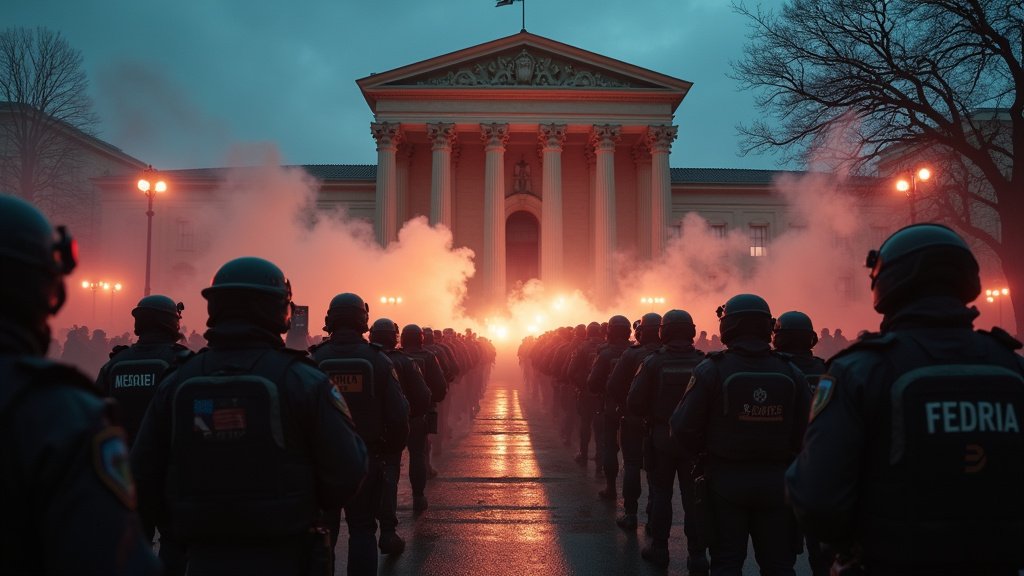PORTLAND, ORE. – In the summer of 2020, President Donald Trump announced his intention to deploy federal troops to Portland, Oregon, declaring an intent to combat “domestic terrorists” and protect U.S. Immigration and Customs Enforcement (ICE) facilities that he claimed were “under siege.” This move ignited a fierce controversy, pitting federal authority against local leadership and raising significant questions about civil liberties and the use of federal power in American cities. The deployment, part of a broader strategy by the Trump administration to confront what it termed the “radical left,” escalated tensions and led to widespread legal challenges.
Federal Forces Descend on Portland Amidst Unrest
The deployment of federal agents to Portland, Oregon, began in July 2020, following nearly two months of continuous protests against police brutality and racial injustice, sparked by the killing of George Floyd. President Trump, citing an executive order aimed at protecting federal monuments and property, directed the Department of Homeland Security (DHS) to send agents, including those from Customs and Border Protection (CBP) and ICE, to the city. The stated purpose was to quell escalating unrest, particularly around federal buildings like the Mark O. Hatfield Federal Courthouse and ICE facilities. Trump characterized the protesters as “anarchists” and “domestic terrorists,” asserting that local leadership had failed to restore order.
Local Leaders Condemn Federal Intervention
Portland’s Mayor, Ted Wheeler, vehemently opposed the federal presence, describing it as “urban warfare” and an “absolute abuse of federal law enforcement officials.” Wheeler and Oregon Governor Kate Brown, both Democrats, argued that the federal agents’ presence exacerbated tensions rather than de-escalating them. The mayor accused the Trump administration of using the city as a “staging ground to further his political agenda” and of deploying federal agents like a “personal army.” Tensions reached a peak when Mayor Wheeler himself was tear-gassed by federal agents while standing with protesters outside the federal courthouse, an event he described as “flat-out urban warfare.” Governor Brown engaged in discussions with the White House, ultimately securing an agreement for a phased withdrawal of federal agents, with state and local law enforcement taking over the protection of federal property.
Allegations of Unconstitutional Tactics and Legal Battles
The actions of the federal agents in Portland quickly drew widespread criticism and legal scrutiny. Reports and videos emerged showing agents in unmarked vehicles detaining protesters off the streets, often without clear identification or explanation. The American Civil Liberties Union (ACLU) of Oregon filed multiple lawsuits against DHS and the U.S. Marshals Service, alleging that federal agents used excessive force, including tear gas, rubber bullets, and acoustic weapons, against protesters, journalists, and legal observers. The ACLU sought to block federal law enforcement from dispersing or arresting these individuals, arguing that their actions violated constitutional rights. A federal court later issued a temporary restraining order against federal agents concerning their actions toward journalists and legal observers. Subsequent investigative reports and audits revealed that many federal agents deployed to Portland lacked proper training and authorization for their law enforcement functions, and that the DHS’s intelligence-gathering efforts may have infringed upon First Amendment rights. In early 2025, a lawsuit alleging excessive force by federal agents against protesters was settled, with the federal government compensating individuals for injuries sustained, though specific amounts were not disclosed.
Broader Context and Lingering Questions
The deployment to Portland was part of a larger pattern by the Trump administration to deploy federal forces to cities experiencing protests, including Chicago and Seattle, often against the wishes of local officials. While the legal basis for deploying federal personnel to protect federal property was cited, the extent to which these agents engaged in domestic law enforcement functions outside their intended scope remained a point of contention and legal challenge. The events in Portland highlighted a significant debate over federalism, the balance of power between federal and local authorities, and the protection of civil liberties during times of civil unrest. As residents of Oregon continue to explore the implications of these events, the news serves as a stark reminder of the complexities involved in managing public safety and upholding constitutional rights. The city’s ongoing efforts to foster community and rebuild trust are a testament to its resilience, and many hope to enjoy a future where such conflicts are avoided.




